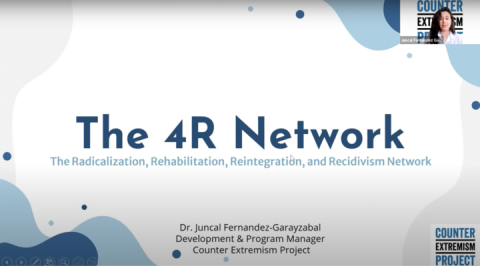(New York, N.Y.) — Last Wednesday, the Counter Extremism Project (CEP) hosted the first in a series of 26 online workshops for members of the Radicalization, Rehabilitation, Reintegration, and Recidivism Network (4R Network), a network of stakeholders that facilitates a whole-of-society approach to extremist and terrorist offender reintegration and recidivism reduction. The network, funded by the U.S. Department of Homeland Security (DHS)’s Center for Prevention Programs and Partnerships (CP3), connects those tasked with the monitoring and supervision of extremist offenders to practitioners with expertise in reintegration and deradicalization-oriented programming. The aim is to ensure that every actor tasked with supervising extremist offenders in-prison and/or in-community has adequate knowledge and access to evidence-based support for reintegration.
The first online workshop, “Creating a Community of Practice,” featured a presentation from CEP Development and Program Manager Dr. Juncal Fernandez-Garayzabal explaining how the 4R Network works in tandem with CEP’s reintegration and recidivism reduction program, Alternative Pathways, another DHS-supported initiative. The workshop also included a presentation from Beyond Conflict’s Director of Research Dr. Vivian Khedari DePierro that explored the need for proper physical and psychological trauma training for those aiding reintegrating extremist offenders.
“CEP is excited to offer 4R Network members access to renowned subject matter experts covering a wide-range of topics relevant to the reintegration and rehabilitation of extremist offenders in the United States,” said CEP Executive Director David Ibsen. “We are proud that with the launch of our workshop series that the 4R Network is moving the U.S. closer to a whole-of-society approach to extremist offender reintegration and recidivism reduction, and we encourage practitioners to connect with us and join our growing community.”

Membership in the 4R Network is open to members of the law enforcement, criminal justice, and mental health communities as well as psychosocial support providers, P/CVE practitioners, former extremists, survivors, religious leaders, and other individuals interested in exploring best practices of the rehabilitation and reintegration of extremists as well as how to better address the needs of convicted extremists.
To learn more about the 4R Network and access future members-only online workshops, please click here.